英语常用句型集锦
(完整版)英语常用句型大全
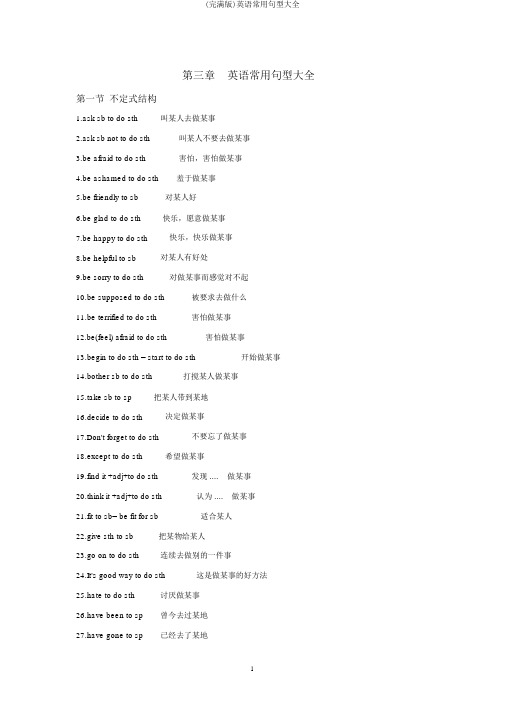
第三章英语常用句型大全第一节不定式结构1.ask sb to do sth叫某人去做某事2.ask sb not to do sth叫某人不要去做某事3.be afraid to do sth害怕,害怕做某事4.be ashamed to do sth羞于做某事5.be friendly to sb对某人好6.be glad to do sth快乐,愿意做某事7.be happy to do sth快乐,快乐做某事8.be helpful to sb对某人有好处9.be sorry to do sth对做某事而感觉对不起10.be supposed to do sth被要求去做什么11.be terrified to do sth害怕做某事12.be(feel) afraid to do sth害怕做某事13.begin to do sth = start to do sth开始做某事14.bother sb to do sth打搅某人做某事15.take sb to sp把某人带到某地16.decide to do sth决定做某事17.Don't forget to do sth不要忘了做某事18.except to do sth希望做某事19.find it +adj+to do sth发现 ....做某事20.think it +adj+to do sth认为 ....做某事21.fit to sb= be fit for sb适合某人22.give sth to sb把某物给某人23.go on to do sth连续去做别的一件事24.It's good way to do sth这是做某事的好方法25.hate to do sth讨厌做某事26.have been to sp曾今去过某地27.have gone to sp已经去了某地28.have sth to do有什么事情要做29.hope to do sth希望做某事30.introduce sb to sb介绍某人给某人认识31.invite sb to do sth邀请某人做某事32.It takes sb +一段时间 +to do sth花多久时间做某事33.It's +adj+ to do sth做某事怎么样34.It's a good idea for sb to do sth对某人来说去做某事是个好想法35.learn to do sth学着去做某事36.make a decision to do sth下定信心做某事37.want to do sth想要做某事38.need to do sth需要去干某事39.offer sth to sb给某人供应某物40.pretend to do sth装着去做某事41.take sth to sb带某物给某人42.like to do sth喜欢做某事43.show sth to do把某物拿给某人看44.encourage sb to do sth激励某人去做某事45.warn sb to do sth劝说某人做某事46.be used to do sth被用来做某事47.It's best to do sth最好去看某事48.stop to do sth停下来往做某事49.Have nothing to do with与做某事不有关50.be allowed to do被同意做某事51.forget to do sth忘记做过某事52.would like to do sth想要做某事53.prefer sth to sth喜欢某物胜过某物54.Prefer to do sth rather than do喜欢做某事胜过做某事55.Say hello to sb向某人问好56.It's time to do sth是做某事的时间到了57.trouble sb to do sth麻烦某人某事58.tell sb to do sth叫某人做某事59.need to do sth需要干某事60.It's a good place to do sth它是做某事的好地方第二节动原结构1.Would you please do sth请你做某事2.can do sth能够做某事 may ,must,could,might,would,should,shall3.be going to do sth打算,将去做某事4.need do sth必定干某事5.had better do sth最好干某事6.have to do sth不得不去做某事7.let sb do sth让某人做某事8.make sb do sth使得某人做某事9.have sb do sth让某人做某事10.Why not do sth为什么不去做某事11.Why don't you do sth你为什么不去做某事12. 句子里面有 do,does,don't,does't did,didn't ,后边动词 +do sth13.prefer to do sth rather than do sth喜欢做某事而不去做某事14.would rather do sth than do sth宁愿而不ed to do sth过去常常做某事16.do nothing but do sth除了做 sth不能够做任何其他事情17.help sb do sth帮助某人做某事18.Feel,listen,look,see,hear,notice,wacth+do sth19.please do sth请做某事20. 神情动词〔 can,may,must,will,ought. to ,might,could,dare to )+动原〔 do sth)第三节动词 ing句型1.feel like doing sth想要做某事2.stop.... .from doing sth阻拦。
英语最常用的60个句型及例句
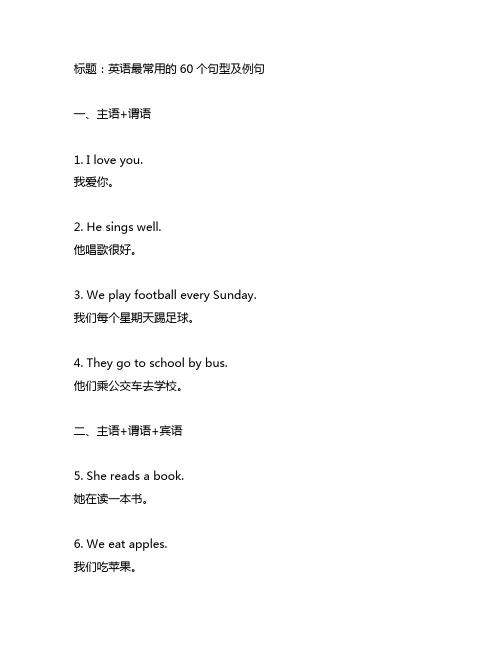
标题:英语最常用的60个句型及例句一、主语+谓语1. I love you.我爱你。
2. He sings well.他唱歌很好。
3. We play football every Sunday. 我们每个星期天踢足球。
4. They go to school by bus.他们乘公交车去学校。
二、主语+谓语+宾语5. She reads a book.她在读一本书。
6. We eat apples.我们吃苹果。
7. He speaks English.他讲英语。
8. They watch TV.他们看电视。
三、主语+谓语+宾语+宾语补足语9. She paints the wall red.她把墙刷成了红色。
10. We call him a hero.我们称他为英雄。
11. He considers the plan unfeasible. 他认为这个计划不可行。
12. They make their father proud.他们让父亲感到自豪。
四、主语+系动词+表语13. I am a teacher.我是一名老师。
14. She was happy.她很快乐。
15. He is my friend.他是我的朋友。
16. They are students.他们是学生。
五、主语+谓语+间宾+直宾17. She teaches us English. 她教我们英语。
18. He bought her a gift. 他给她买了一份礼物。
19. We tell him a story.我们给他讲故事。
20. They show us the way.他们给我们指路。
六、主语+谓语+宾补+宾语21. She made her sister cry.她让她妹妹哭了。
22. They found the problem solved. 他们发现问题已经解决了。
23. He heard the news spread.他听说了消息已经传开了。
英语常用句型100句

英语常用句型100句1. It's a pleasure to meet you. (很高兴见到你。
)2. How are you? (你好吗?)3. What's your name? (你叫什么名字?)4. Where are you from? (你来自哪里?)5. How old are you? (你多大了?)6. Can you speak English? (你会说英语吗?)7. What do you do for a living? (你的职业是什么?)8. How do you spell that? (你怎么拼写那个?)9. What is your favorite food? (你最喜欢的食物是什么?)10. Where do you live? (你住在哪里?)11. What time is it? (现在几点了?)12. Can you help me? (你能帮助我吗?)13. I don't understand. (我不明白。
)14. Could you please repeat that? (你能再重复一遍吗?)15. How much does it cost? (这个多少钱?)16. Where is the nearest bank? (最近的银行在哪里?)17. What's the weather like today? (今天天气怎么样?)18. I'm sorry. (对不起。
)19. Excuse me. (打扰一下。
)20. Do you have any questions? (你有什么问题吗?)21. Nice to meet you. (很高兴认识你。
)22. How do you do? (你好。
)23. What do you think? (你觉得怎么样?)24. Can I help you? (我能帮你吗?)25. What's your favorite color? (你最喜欢的颜色是什么?)26. Where are you going? (你要去哪里?)27. What do you want to do? (你想做什么?)28. How was your day? (你今天过得怎么样?)29. Can you show me on the map? (你能在地图上给我看吗?)30. What's your phone number? (你的电话号码是多少?)31. How long have you been learning English? (你学英语学了多久了?)32. How far is it from here? (离这里有多远?)33. What's your favorite movie? (你最喜欢的电影是什么?)34. Do you have any siblings? (你有兄弟姐妹吗?)35. What's your favorite book? (你最喜欢的书是什么?)36. What's your favorite sport? (你最喜欢的运动是什么?)37. Can I have a glass of water, please? (请给我一杯水。
英语常用句型

常用句型1 There be +主语+doing +地点某地有某人(做某事)There be 的各时态:There is going to be / There will beThere has/have beenThere used to be2 So+ 助动词+主(前提为肯定句)/ Neither+助动词+主(前提为否定句)也一样/也一样不So+ 主+助动词的确如此3 感叹句:What+a/an+adj+名词+主+动词What+adj+名词复数+主+动词How+adj/adv +主+动词4 如此---以致于So+adj/adv+that+句子So+adj+a/an+名词单数+ that+句子So+many/much/little/few+ 名词+ thatSuch+a/an+adj+名词单数+ that/ such+adj+名词复数/不可数名词+that5 无论----No matter+疑问词+主+谓,主+谓6 It 句型:It is +adj/n+for sb to doIt is adj(nice/clever/kind/foolish) of sb to doIt is +V-ed(said/reported/believed) that 据说/报道/有人相信-------It’s +adj(impossible/necessary) thatIt seems that 看上去-------- It seems as if 好像------It’s one’s turn to do sth. 轮到某人做某事It takes sb time to do sth= sb spend time doing sth.It is + 一段时间since 主+动词(过去式)自某动作发生到现在多久It’s+ 一段距离+ from A to B 两点相离多远距离动词(find/make/ feel/ think/ believe)+it adj +(for sb) to doIt will be + 一段时间before +主+一般现在时过多久某事才发生7 主+谓+one of+ the 最高级+名词复数+范围某人/事是最------之一The+比较级+主+谓,the+比较级+(主+谓)越------就越------主+谓+as+形容词原型+as+B A 和B一样-------主+谓+形容词原型+enough (for sb) to do 够------可以------8 否定转移句型:I don’t think/think/ suppose/ imagine/guess+句子我认为-------不含插入语的疑问句:疑问词+do you think/suppose/ guess +主+谓+----?9 祈使句, and/ or+主+ will do10 含有倒装的句型:Only+状语(介词短语/状语从句)+助+主+谓语动词Not only+助动词+主+谓语动词,but also+主+谓语动词不但-------而且------11 问人口句型:What’s the population of -----?12 问价格句型:What’s the price of -------?13 强调句型It is+ 强调部分+that+ 句子其他成分(强调主语是还可用who)14 By the time +主+过去式,主+had +动词过去分词15 做-----的方式the way+主+谓16 地点状语从句where引导主+谓+where+主+谓-----的地方17 if 引导的虚拟语气If主+动词过去式/were+-----,主+would do+------(与现在相反)If主+ had done+-------, 主+would have done+----(与过去相反)练习:用以上句型造句1 外面站着一个人2 明天如果你去,我们也去3 李明擅长弹钢琴。
英语常用句型归纳
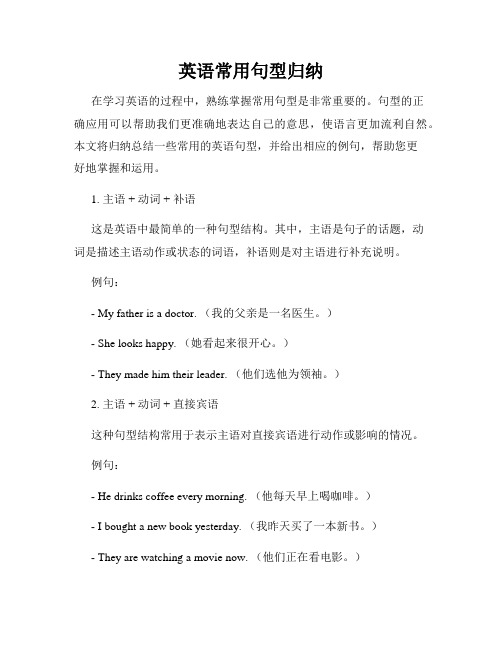
英语常用句型归纳在学习英语的过程中,熟练掌握常用句型是非常重要的。
句型的正确应用可以帮助我们更准确地表达自己的意思,使语言更加流利自然。
本文将归纳总结一些常用的英语句型,并给出相应的例句,帮助您更好地掌握和运用。
1. 主语 + 动词 + 补语这是英语中最简单的一种句型结构。
其中,主语是句子的话题,动词是描述主语动作或状态的词语,补语则是对主语进行补充说明。
例句:- My father is a doctor. (我的父亲是一名医生。
)- She looks happy. (她看起来很开心。
)- They made him their leader. (他们选他为领袖。
)2. 主语 + 动词 + 直接宾语这种句型结构常用于表示主语对直接宾语进行动作或影响的情况。
例句:- He drinks coffee every morning. (他每天早上喝咖啡。
)- I bought a new book yesterday. (我昨天买了一本新书。
)- They are watching a movie now. (他们正在看电影。
)该句型中,主语通过动词将一物品直接给予另一个人或事物。
例句:- She gave me a gift. (她给了我一件礼物。
)- Can you send him a message? (你可以给他发个信息吗?)- We bought our mom a new phone. (我们给妈妈买了一部新手机。
)4. 主语 + 动词 + 宾补这种句型中,主语通过动词使宾语成为某种状态或者描述。
例句:- I consider him my best friend.(我把他当作我最好的朋友。
)- They elected him president. (他们选举他当总统。
)- We made it to the top. (我们成功登顶了。
)5. There be 句型"There be"句型表示某处存在某人或某物。
英文常用的62个英语句型

英文常用的62个英语句型句型1:There+be +主语+地点状语/时间状语There’s a boat in the river. 河里有条船.句型2:What’s wrong with+sb. / sth. ?What’s wrong with your watch?你的手表有什么毛病?句型3:How do you like...?How do you like China?你觉得中国怎么样?句型4:What do you like about...?What do you like about China?你喜欢中国的什么?句型5:had better(not)+动词原形You’d better ask that policeman over there. 你最好去问问那边的那个警察。
句型6:How+adj. / adv. +主语+谓语!What a/ an+adj. +n. +主语+谓语!How cold it is today !今天多冷啊!What a fine picture it is!多美的一幅图画呀!句型7:Thank+sb. +for(doing)sth.Thank you for coming to see me. 感谢你来看我。
句型8:So+be/ 情态动词/ 助动词+主语He is a student. So am I. 他是一个学生,我也是。
句型9:... not ... until ...He didn’t have supper until his parents came back.直到他的父母回来他才吃饭。
句型10:比较级+and+比较级The baby cried harder and harder. 那孩子哭得越来越厉害。
句型11:the +比较级,the +比较级The more one has,the more one wants. 越有越贪。
句型12:... as +adj./ adv.+as ...…not as(so) +adj. / adv. +as ...Do you think that art is as important asmusic?你认为艺术和音乐一样重要吗?Last Sunday the weather was not so wet as it is today.上个星期天的天气不如今天的天气潮湿。
100句英语常用句型

100句英语常用句型一、表达观点1.In my opinion,...(在我看来……)2.I think...(我认为……)3.As far as I'm concerned,...(就我而言……)4.It seems to me that...(在我看来……)5.I believe...(我相信……)6.From my perspective,...(从我的角度来看……)7.Personally, I feel that...(就个人而言,我觉得……)二、询问意见8.What's your opinion?(你有什么看法?)9.How do you think about it?(你觉得怎么样?)10.What's your view on this matter?(你对这件事有什么看法?)11.Do you have any thoughts on...?(你对……有什么想法吗?)12.Could you give me your opinion on...?(你能给我你对……的意见吗?)三、同意与不同意13.I agree with you.(我同意你的观点。
)14.I couldn't agree more.(我完全同意。
)15.That's exactly what I think.(那正是我所想的。
)16.I'm of the same opinion.(我有同样的看法。
)17.On the contrary, I don't think so.(相反,我不这么认为。
)18.I disagree with you.(我不同意你的观点。
)19.I'm afraid I can't agree.(恐怕我不能同意。
)20.That's not how I see it.(我不是这么看的。
)四、请求帮助21.Could you help me?(你能帮我吗?)22.Would you please do me a favor?(你能帮我个忙吗?)23.Can you give me a hand?(你能帮我一下吗?)24.I need your help.(我需要你的帮助。
常用英语句型
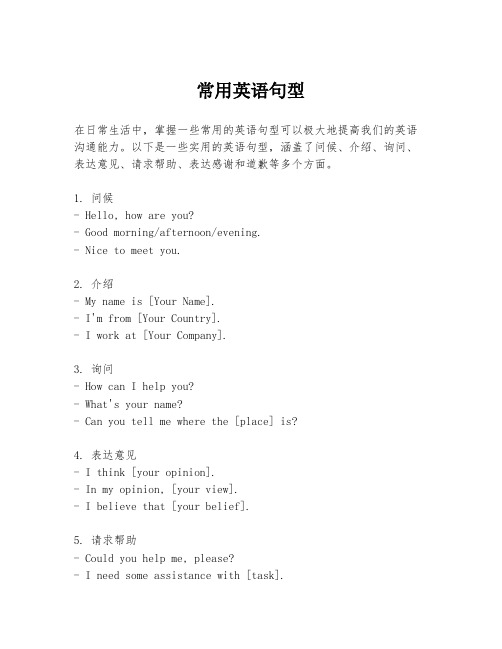
常用英语句型在日常生活中,掌握一些常用的英语句型可以极大地提高我们的英语沟通能力。
以下是一些实用的英语句型,涵盖了问候、介绍、询问、表达意见、请求帮助、表达感谢和道歉等多个方面。
1. 问候- Hello, how are you?- Good morning/afternoon/evening.- Nice to meet you.2. 介绍- My name is [Your Name].- I'm from [Your Country].- I work at [Your Company].3. 询问- How can I help you?- What's your name?- Can you tell me where the [place] is?4. 表达意见- I think [your opinion].- In my opinion, [your view].- I believe that [your belief].5. 请求帮助- Could you help me, please?- I need some assistance with [task].- Would you mind [doing something]?6. 表达感谢- Thank you very much.- I appreciate your help.- Thanks a lot for [what they did].7. 道歉- I'm sorry for [what happened].- I apologize for [your mistake].- Excuse me for [your oversight].8. 邀请- Would you like to [do something]? - Are you free to [do something]?- Let's [do something] together.9. 同意和不同意- I agree with you.- I disagree with your point of view. - That's a good idea.10. 表达喜好- I like [something].- I love [something].- I'm not a big fan of [something].11. 表达需求- I need [something].- I want [something].- I require [something].12. 表达能力- I can [do something].- I'm able to [do something].- I'm capable of [doing something].13. 表达时间- What time is it?- It's [time].- I have to go now.14. 表达地点- Where is [place]?- [Place] is located [directions].- I'm going to [place].15. 表达原因- The reason is [reason].- Because [reason].- Due to [reason].通过学习和练习这些句型,你可以更自信地用英语进行日常交流。
英语常用句型100句
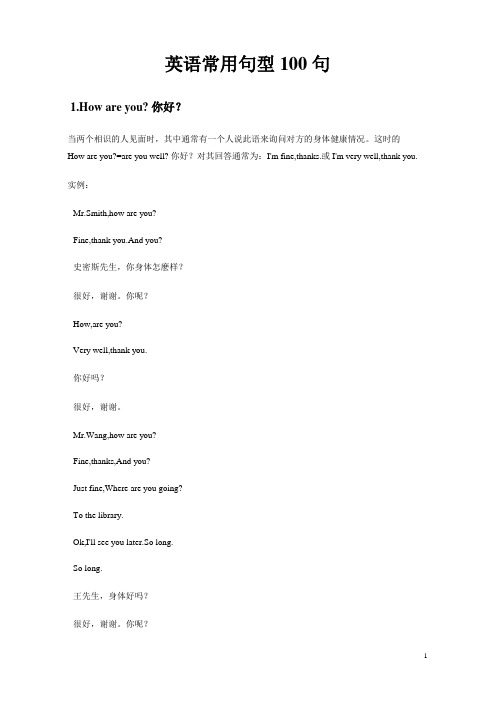
英语常用句型100句1.How are you? 你好?当两个相识的人见面时,其中通常有一个人说此语来询问对方的身体健康情况。
这时的How are you?=are you well? 你好?对其回答通常为:I'm fine,thanks.或I'm very well,thank you.实例:--Mr.Smith,how are you?--Fine,thank you.And you?--史密斯先生,你身体怎麽样?--很好,谢谢。
你呢?--How,are you?--Very well,thank you.--你好吗?--很好,谢谢。
--Mr.Wang,how are you?--Fine,thanks,And you?--Just fine,Where are you going?--To the library.--Ok,I'll see you later.So long.--So long.--王先生,身体好吗?--很好,谢谢。
你呢?--挺好。
你到那儿去?--去图书馆。
--好吧,以后见,再见。
--再见。
2.How is everything with you? 你一切都好吗?此句型表示双方见面后,一方问对方各方面情况,仍为客套话。
类似的说法还有How are things with you? 你一切都好吗?实例:--Hi,Fred!How is everything with you?--Everthing is fine,thank you,What about you?--Quite well.--喂,弗雷德,你好吗?--一切都好,谢谢。
你呢?--很好。
--How are you getting(on,along)with your work?--Very(pretty,quite)well,thank you.--你的工作情况怎样?--很好,谢谢你。
3.Hello! 你好!(喂!)Hello!通常用于以下四种情况:打招呼,打电话,表示惊讶或引起对方的注意。
英语常用句型100句

英语常用句型100句1.I like playing basketball.2.She is a teacher.3.He enjoys listening to music.4.We went to the beach last weekend.5.It will rain tomorrow.6.They are studying hard for the exam.7.I have a dog named Max.8.She doesn’t like coffee.9.He can speak French fluently.10.We should finish this project by the end of the week.11.Are you coming to the party?12.I need to buy some groceries.13.She has a beautiful smile.14.He is always late for meetings.15.We are going on a trip next month.16.It’s too cold outside.17.They have a big house in the mountains.18.I want to learn how to play the guitar.19.She is very good at swimming.20.He likes to read books in his free time.21.We are going to the concert on Saturday.22.Could you pass me the salt, please?23.She is going to the gym after work.24.He doesn’t eat meat.25.We have a test next week.26.I don’t have a car.27.She is going to the store to buy some clothes.28.He is from Australia.29.We are going to have a barbecue in the backyard.30.It’s too hot to go outside.31.They like to go hiking on weekends.32.I need to make a phone call.33.She is going to the library to study.34.He is watching a movie on TV.35.We are going to paint the living room this weekend.36.It’s raining outside.37.They are going on a vacation next month.38.I have a doctor’s appointment tomorrow.39.She is going to the park with her friends.40.He likes to play video games in his free time.41.We need to clean the house before the guests arrive.42.It’s getting dark outside.43.They have a soccer game on Saturday.44.I want to learn how to cook.45.She is listening to music in her room.46.He is going to the basketball game tonight.47.We are going to the beach for the holiday.48.It’s snowing outside.49.They are going to the movies this evening.50.I have a job interview tomorrow.51.She is going to the dentist next week.52.He likes to go fishing on weekends.53.We need to water the plants in the garden.54.It’s getting late, we should go home.55.They have a meeting at work in the morning.56.I want to join a yoga class.57.She is going to the party with her friends.58.He is playing the guitar in the living room.59.We are going to have dinner at a restaurant tonight.60.It’s windy outside.61.They like to go camping in the summer.62.I have a flight to catch tomorrow.63.She is going to the gym to work out.64.He likes to ride his bike to work.65.We are going to visit our grandparents next weekend.66.It’s a beautiful day outside.67.They are going to the zoo with their kids.68.I want to take a cooking class.69.She is going to the beach to relax.70.He is practicing his piano skills.71.We are going to have a picnic in the park.72.It’s a cloudy day.73.They like to go shopping on weekends.74.I have a book club meeting tonight.75.She is going to the spa for a massage.76.He likes to go for a run in the morning.77.We are going to bake cookies this afternoon.78.It’s a sunny day outside.79.They are going to a concert next month.80.I want to learn how to dance.81.She is going to the theater with her friends.82.He is playing basketball with his buddies.83.We are going to have a barbecue in the backyard.84.It’s a rainy day outside.85.They like to go hiking on weekends.86.I have a doctor’s appointment tomorrow.87.She is going to the park with her friends.88.He likes to play video games in his free time.89.We need to clean the house before the guests arrive.90.It’s getting dark outside.91.They have a soccer game on Saturday.92.I want to learn how to cook.93.She is listening to music in her room.94.He is going to the basketball game tonight.95.We are going to the beach for the holiday.96.It’s snowing outside.97.They are going to the movies this evening.98.I have a job interview tomorrow.99.She is going to the dentist next week.100.He likes to go fishing on weekends.以上是英语常用句型100句,希望对大家的英语学习有所帮助。
62个常用英语句型和例句

62个常用英语句型和例句:1. Subject + used to + verb...意思:表示过去常常做某事,现在不再做了。
I used to play basketball every day.我过去每天打篮球。
She used to get up early.她过去早起。
John used to stay up late.约翰过去经常熬夜。
2. Subject + be used to + verb-ing/noun.意思:表示习惯于做某事或习惯于某物。
She is used to getting up early.她习惯早起。
He is used to the cold weather.他习惯了寒冷的天气。
They are used to working late.他们习惯了工作到很晚。
3. Subject + prefer + noun/verb-ing + to + noun/verb-ing.意思:表示更喜欢做某事而不是另一件事。
I prefer reading to watching TV.我更喜欢阅读而不是看电视。
She prefers tea to coffee.她更喜欢茶而不是咖啡。
They prefer walking to driving.他们更喜欢步行而不是开车。
4. Subject + had better (not) + verb...意思:表示建议最好做某事或不做某事。
You had better finish your homework.你最好完成作业。
She had better not go out tonight.她今晚最好不要外出。
We had better take an umbrella.我们最好带把伞。
5. It seems that...意思:表示似乎,好像。
It seems that he is not coming.他似乎不来了。
It seems that they are busy.他们似乎很忙。
常用英语句型

1. as 句型(1) as引导方式状语从句句型:“按照……;正如……”例:As(it is)in your country, we grow wheat in the north and rice in the south. 正如(像) 你们国家一样,我们北方种植小麦,南方种植水稻。
(2) as+形容词/副词原级+(a /an)+名词+as ;否定式:not as/so --- as例:He is as good a player as his sister.他和他姐姐一样是位优秀的运动员。
(3) such + n. + as to do 如此……以致于……例:She is such a fool as to believe what he said.她是一个如此的一个笨蛋以致相信了他所说的话。
(4) so + adj./adv. + as to do sth 如此……以致于……例:He was so strong as to carry the heavy box.他是如此的强壮以致于能提起那重箱子。
(5) such...as... 象……之类的…… (接名词或定语从句)例:He wished to be such a man as Lei Feng was.他希望成为一个像雷锋这样的人。
(6) the same +名词+as 和……一样的…… (接名词或定语从句)例:He is not the same man as he used to be.他不是从前的那样子了。
(7) as 引导非限制性定语从句例:As is known to us, knowledge is power.众所周知,知识就是力量。
(8)引导时间状语从句,与while意义相近例:We get wiser as we get older.随着我们长大,我们也变得越来越聪明。
(9) 引导原因状语从句,与because的用法相近例:As it was getting very late, we soon turned back.因为越来越迟了,所以我们不久就回来了。
英语常用的句型
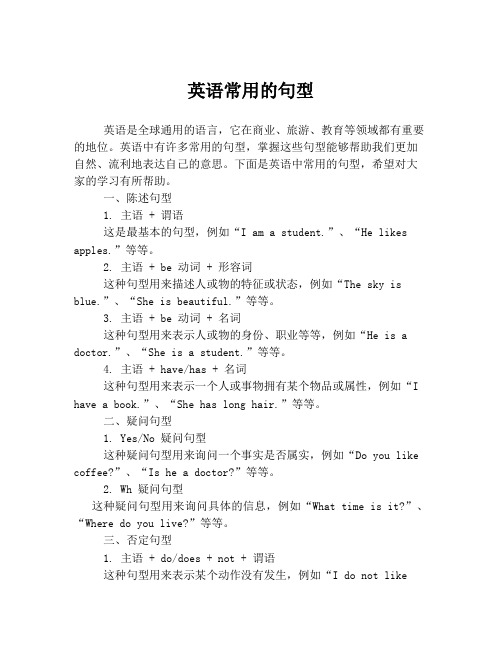
英语常用的句型英语是全球通用的语言,它在商业、旅游、教育等领域都有重要的地位。
英语中有许多常用的句型,掌握这些句型能够帮助我们更加自然、流利地表达自己的意思。
下面是英语中常用的句型,希望对大家的学习有所帮助。
一、陈述句型1. 主语 + 谓语这是最基本的句型,例如“I am a student.”、“He likes apples.”等等。
2. 主语 + be 动词 + 形容词这种句型用来描述人或物的特征或状态,例如“The sky is blue.”、“She is beautiful.”等等。
3. 主语 + be 动词 + 名词这种句型用来表示人或物的身份、职业等等,例如“He is a doctor.”、“She is a student.”等等。
4. 主语 + have/has + 名词这种句型用来表示一个人或事物拥有某个物品或属性,例如“I have a book.”、“She has long hair.”等等。
二、疑问句型1. Yes/No 疑问句型这种疑问句型用来询问一个事实是否属实,例如“Do you like coffee?”、“Is he a doctor?”等等。
2. Wh 疑问句型这种疑问句型用来询问具体的信息,例如“What time is it?”、“Where do you live?”等等。
三、否定句型1. 主语 + do/does + not + 谓语这种句型用来表示某个动作没有发生,例如“I do not likecoffee.”、“She does not watch TV.”等等。
2. 主语 + be 动词 + not + 形容词/名词这种句型用来表示一个人或物没有某个特征或状态,例如“The sky is not blue.”、“She is not a doctor.”等等。
四、感叹句型1. How + 形容词/副词 + 主语 + 谓语!这种句型用来表达强烈的情感或评价,例如“How beautiful the flowers are!”、“How fast he runs!”等等。
英语常用写作句型大全
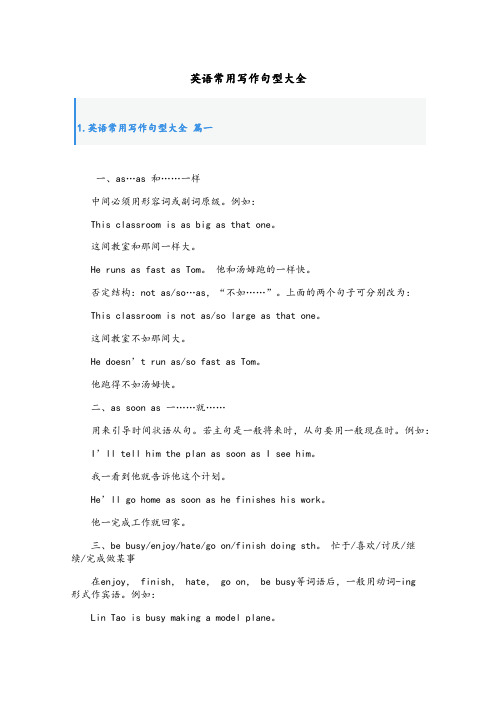
英语常用写作句型大全1.英语常用写作句型大全篇一一、as…as 和……一样中间必须用形容词或副词原级。
例如:This classroom is as big as that one。
这间教室和那间一样大。
He runs as fast as Tom。
他和汤姆跑的一样快。
否定结构:not as/so…as,“不如……”。
上面的两个句子可分别改为:This classroom is not as/so large as that one。
这间教室不如那间大。
He doesn’t run as/so fast as Tom。
他跑得不如汤姆快。
二、as soon as 一……就……用来引导时间状语从句。
若主句是一般将来时,从句要用一般现在时。
例如:I’ll tell him the plan as soon as I see him。
我一看到他就告诉他这个计划。
He’ll go home as soon as he finishes his work。
他一完成工作就回家。
三、be busy/enjoy/hate/go on/finish doing sth。
忙于/喜欢/讨厌/继续/完成做某事在enjoy, finish, hate, go on, be busy等词语后,一般用动词-ing形式作宾语。
例如:Lin Tao is busy making a model plane。
林涛正忙着做飞机模型。
My mother enjoys taking a walk after supper。
我妈妈喜欢晚饭后散步。
I hate watching Channel Five。
我讨厌看五频道。
When someone asked him to have a rest, he just went on working。
当有人让他休息一会儿时,他仍继续工作。
I have finished writing the story。
英语常用句式

英语常用句式1、“主语 + 谓语(不及物动词)”(即“主谓”句型)这一句型英汉语言结构形式完全相同,说明“某人或某物如何动作”,或者说“某人或某物自身怎样运动”。
例:They arrived in Harbin yesterday morning.分析:“they”(主语)“arrived”(谓语)。
2、“主语 + 谓语(及物动词) + 宾语”(即“主谓宾”句型)这一句型英汉语言的结构形式完全相同,用以说明“某人或某物做什么事情”,或者说“某人或某物发出了动作,并且其动作涉及另一个人或物”。
例:I study English.分析:“I”(主语)“study”(谓语动作)“English”(宾语即动作涉及的对象)。
3、“主语 + 谓语(及物动词) + 间接宾语 + 直接宾语”(即“主谓双宾”句型)这一句型英汉语序结构相同,说明“某人为谁(间接宾语为人)做某事”,或者说“某人或物的运动涉及两个对象,其中一个间接对象为人,另一个为物”。
例:Our teacher taught us English.分析:“our teacher”(主语) “taught”(谓语动作)“us”(间接宾语)“English”(直接宾语)。
4、So+be/情态动词/助动词+主语He is a student. So am I.他是一个学生,我也是。
5、not…until…He didn't have supper until his parents came back.直到他的父母回来他才吃饭。
6、比较级十and+比较级The baby cried harder and harder.那孩子哭得越来越厉害。
7、……是必要的 It is necessary (for sb.) todo/that………是重要的 It is important/essential (for sb.) to do / that………是适当的 It is proper (for sb.) to do / that………是紧急的 It is urgent (for sb.) to do / that…例:It is proper for us to keep the public places clean.=It is proper that we (should) keep the public places clean. 我们应当保持公共场所清洁。
100句英语常用句型
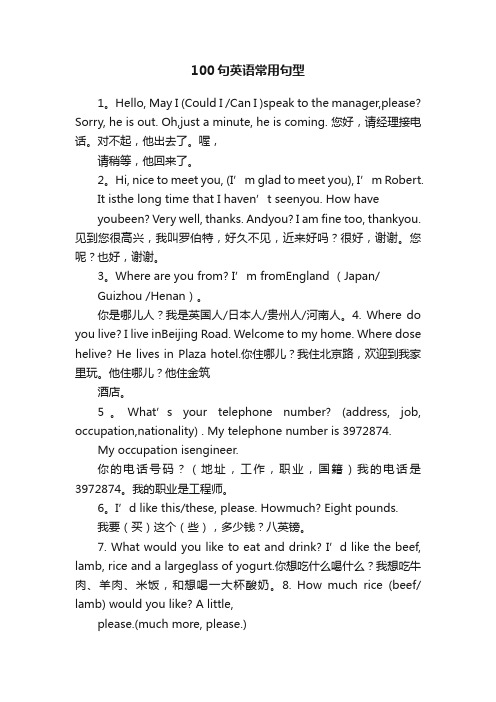
100句英语常用句型1。
Hello, May I (Could I /Can I )speak to the manager,please? Sorry, he is out. Oh,just a minute, he is coming. 您好,请经理接电话。
对不起,他出去了。
喔,请稍等,他回来了。
2。
Hi, nice to meet you, (I’m glad to meet you), I’m Robert.It isthe long time that I haven’t seenyou. How haveyoubeen? Very well, thanks. Andyou? I am fine too, thankyou. 见到您很高兴,我叫罗伯特,好久不见,近来好吗?很好,谢谢。
您呢?也好,谢谢。
3。
Where are you from? I’m fromEngland (Japan/Guizhou /Henan)。
你是哪儿人?我是英国人/日本人/贵州人/河南人。
4. Where do you live? I live inBeijing Road. Welcome to my home. Where dose helive? He lives in Plaza hotel.你住哪儿?我住北京路,欢迎到我家里玩。
他住哪儿?他住金筑酒店。
5。
What’s your telephone number? (address, job, occupation,nationality) . My telephone number is 3972874.My occupation isengineer.你的电话号码?(地址,工作,职业,国籍)我的电话是3972874。
我的职业是工程师。
6。
I’d like this/these, please. Howmuch? Eight pounds.我要(买)这个(些),多少钱?八英镑。
英语常用口语100个母句型

100个常用的英语口语母句型表达观点与看法1. I think… 我认为……- I think it's a great idea. 我认为这是个很棒的主意。
2. In my opinion… 在我看来……- In my opinion, we should go for it. 在我看来,我们应该去争取。
3. As far as I'm concerned… 就我而言……- As far as I'm concerned, it doesn't matter. 就我而言,这没关系。
4. I believe… 我相信……- I believe you can do it. 我相信你能做到。
5. It seems to me that… 在我看来似乎……- It seems to me that something is wrong. 在我看来似乎有些不对劲。
日常问候与寒暄6. How are you? 你好吗?- How are you doing? 你过得怎么样?7. What's up? 怎么了?有什么事吗?- What's new? 有什么新鲜事吗?8. Long time no see. 好久不见。
- It's been a long time. 已经很久了。
9. How's everything? 一切都好吗?- How's your day? 你今天过得怎么样?10. Nice to see you. 很高兴见到你。
- Nice to meet you. 很高兴认识你。
谈论喜好与兴趣11. I like… 我喜欢……- I like reading books. 我喜欢读书。
12. I'm interested in… 我对……感兴趣。
- I'm interested in learning English. 我对学习英语感兴趣。
最常用的150句地道美式英语句型
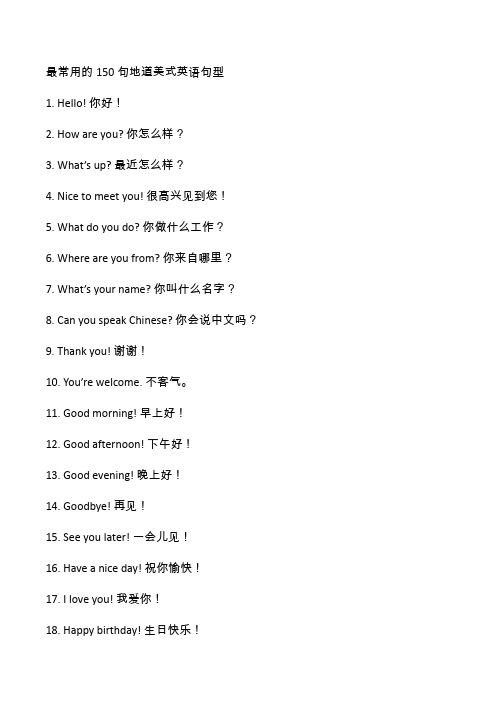
最常用的150句地道美式英语句型1. Hello! 你好!2. How are you? 你怎么样?3. What’s up? 最近怎么样?4. Nice to meet you! 很高兴见到您!5. What do you do? 你做什么工作?6. Where are you from? 你来自哪里?7. What’s your name? 你叫什么名字?8. Can you speak Chinese? 你会说中文吗?9. Thank you! 谢谢!10. You’re welcome. 不客气。
11. Good morning! 早上好!12. Good afternoon! 下午好!13. Good evening! 晚上好!14. Goodbye! 再见!15. See you later! 一会儿见!16. Have a nice day! 祝你愉快!17. I love you! 我爱你!18. Happy birthday! 生日快乐!19. Congratulations! 恭喜!20. I’m sorry. 对不起。
21. Excuse me. 对不起。
22. Could you repeat that, please? 能再说一遍吗?23. Can you help me? 你能帮我吗?24. I don’t understand. 我不明白。
25. What does that mean? 那是什么意思?26. How much is it? 这个多少钱?27. What time is it? 几点了?28. Do you have the time? 你有时间吗?29. Where is the bathroom? 厕所在哪里?30. Can I have a menu, please? 可以给我一份菜单吗?31. I would like to order. 我想要点餐。
英语常用句型就这58句
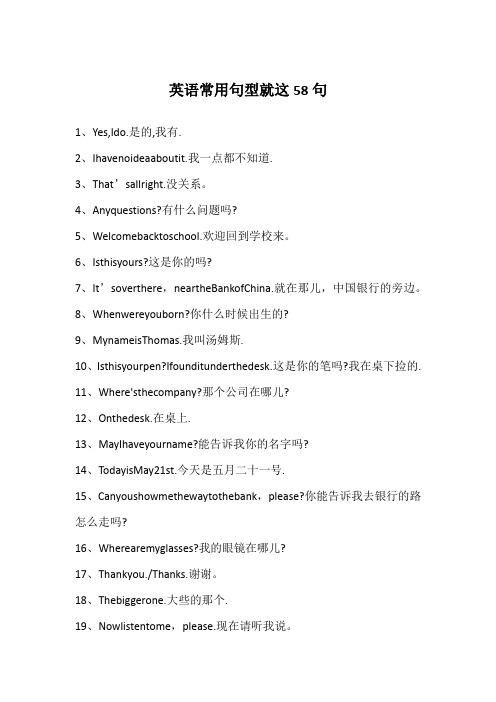
英语常用句型就这58句1、Yes,Ido.是的,我有.2、Ihavenoideaaboutit.我一点都不知道.3、That’sallright.没关系。
4、Anyquestions?有什么问题吗?5、Welcomebacktoschool.欢迎回到学校来。
6、Isthisyours?这是你的吗?7、It’soverthere,neartheBankofChina.就在那儿,中国银行的旁边。
8、Whenwereyouborn?你什么时候出生的?9、MynameisThomas.我叫汤姆斯.10、Isthisyourpen?Ifounditunderthedesk.这是你的笔吗?我在桌下捡的.11、Where'sthecompany?那个公司在哪儿?12、Onthedesk.在桌上.13、MayIhaveyourname?能告诉我你的名字吗?14、TodayisMay21st.今天是五月二十一号.15、Canyoushowmethewaytothebank,please?你能告诉我去银行的路怎么走吗?16、Wherearemyglasses?我的眼镜在哪儿?17、Thankyou./Thanks.谢谢。
18、Thebiggerone.大些的那个.19、Nowlistentome,please.现在请听我说。
20、What’syourname,please?你的名字是什么?21、It'stwoo'clock.现在两点.22、Hehasthatbook,doesn'the?他有那本书,是吗?23、Whattimeisitnow?现在几点?24、Happybirthday!生日快乐!25、Let’splayagametoday.今天我们来做个游戏。
26、Theoneonyourright.你右边的那个.27、Yes./Allright.Hereyouare.好的。
给你。
28、He'samanager.他是个经理.29、Yes,Iam./No,I'mnot.是,我是./不,我不是.30、Excuseme,what’sthetime,please?请问,几点了?31、Howabouttheblueone?这条蓝色的如何?32、Let’sgotoschool.让我们去学校吧。
英语学习常用的62个句型,地道口语
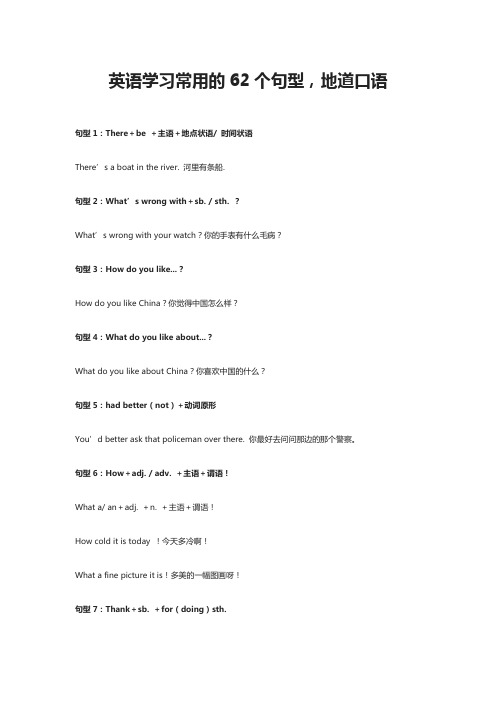
英语学习常用的62个句型,地道口语句型1:There+be +主语+地点状语/ 时间状语There’s a boat in the river. 河里有条船.句型2:What’s wrong with+sb. / sth. ?What’s wrong with your watch?你的手表有什么毛病?句型3:How do you like...?How do you like China?你觉得中国怎么样?句型4:What do you like about...?What do you like about China?你喜欢中国的什么?句型5:had better(not)+动词原形You’d better ask that policeman over there. 你最好去问问那边的那个警察。
句型6:How+adj. / adv. +主语+谓语!What a/ an+adj. +n. +主语+谓语!How cold it is today !今天多冷啊!What a fine picture it is!多美的一幅图画呀!句型7:Thank+sb. +for(doing)sth.Thank you for coming to see me. 感谢你来看我。
句型8:So+be/ 情态动词/ 助动词+主语He is a student. So am I. 他是一个学生,我也是。
句型9:... not ... until ...He didn’t have supper until his parents came back. 直到他的父母回来他才吃饭。
句型10:比较级+and+比较级The baby cried harder and harder. 那孩子哭得越来越厉害。
句型11:the +比较级,the +比较级The more one has,the more one wants. 越有越贪。
- 1、下载文档前请自行甄别文档内容的完整性,平台不提供额外的编辑、内容补充、找答案等附加服务。
- 2、"仅部分预览"的文档,不可在线预览部分如存在完整性等问题,可反馈申请退款(可完整预览的文档不适用该条件!)。
- 3、如文档侵犯您的权益,请联系客服反馈,我们会尽快为您处理(人工客服工作时间:9:00-18:30)。
句型宝典疑问句型What is this?结构︰问句:What+be 动词+this(that…)?答句:This(that…)+be 动词+a book(pen…)。
说明︰此句型意为“这(那)是什么?这(那)是书(钢笔…)”。
what(什么)叫做“疑问词”,用于询问“事物”,通常放在句首,后接 be <动词>,再接<主词>,第一个字母 w要大写,句尾要加问号(?),位置不可排错。
What is this? This is a chair. 这是什么?这是一张椅子。
What’s this? It’s a book. 这是什么?它是一本书。
What is that? That is a desk. 那是什么?那是一张书桌。
What are these?结构︰问句:What are+these/those…?答句:These/Those are+复数名词(+s/es)。
说明︰<主词>与<动词>的形式要一致,is 后面接单数<名词>,are 后面要接复数<名词>。
What are these? These are books. 这些是什么?这些是书。
What are those? Those are cups. 那些是什么?那些是茶杯。
What are they? They are glasses. 它们是什么?它们是玻璃杯。
What are you?结构︰问句:What+be 动词+主词(人)…?答句:主词+be 动词+a student…。
说明︰此句型意为“你是做什么事情的?我是学生…”。
疑问词 what 除了询问事物之外,还可用于询问“人的职业或身分”。
be <动词>随<人称代名词>的变化而改变形态,如:I am,we are,you are,he is…。
What are you? I am a student. 你是做什么事情的?我是一名学生。
What is she? She is a teacher. 她是做什么事情的?她是一名教师。
Are you a ...?结构︰问句:Be 动词(am,are,is)+主词+…?肯定简答:Yes,主词+am(are,is)。
否定简答:No,主词+am(are,is)not。
说明︰在否定<简答句>中,<主词>和 am,is,are 可以缩写;在肯定<简答句>中则不可。
Is he a student? Yes, he is. (No, he isn’t.) 他是学生吗?是的,他是。
(不,他不是。
)Are you a teacher? Yes, I am. (No, I’m not.) 你是教师吗?是的,我是。
(不,我不是。
)Is that a clock? Yes, it is. (No, it isn’t.) 那是钟表吗?是的,它是。
(不,它不是。
)What is your name?结构︰问句:What+is+所有格+name?答句:所有格+name+is+名字。
说明︰“my,your,his,her”为单数人称的<所有格>;<所有格>后面必接<名词>,即“<所有格>+<名词>”;<所有格>不可与 a,an,this,that,these 或 those 紧接一起使用。
What is your name? My name is Sue. 妳叫什么名字?我的名字叫苏。
What is his name? His name is John. 他叫什么名字?他的名字叫约翰。
What is her name? Her name is Jean. 她叫什么名字?她的名字叫珍。
Who is that ...?结构︰问句:Who+be 动词+that+形容词+名词?答句:That is+名字。
说明︰Who 是<疑问代名词>,询问人的“姓名”或“关系”;将<形容词>直接放在<名词>前面,叫做“前位修饰”。
Who is that short boy? That is Bill. 那位矮男孩是谁?那位是比尔。
Who is that tall girl? That is Mary. 那位高女孩是谁?那位是玛丽。
Who is that fat man? He is my uncle. 那位胖男子是谁?那位是我叔叔。
Where is ...?结构︰问句:Where+be 动词(am,are,is)+主词…?答句:主词+be 动词+in the+名词…。
说明︰问句是“Where ...?”,简答时可用<副词词组>“In/On the+<名词>”。
Where is Sue? She is in her room. 苏在那里?她在她的房间里。
Where are your books? On the desk. 你的书在那里?在书桌上。
Where is your mother? She is in the kitchen. 你妈吗在哪里?她在厨房里。
Are you V-ing ...?结构︰Am(Are,Is)+主词+现在分词…?说明︰此句型意为“<主词>(人,物)正在…吗?”。
这一<句型>转换的三要素是:be <动词>移到句首;改为大写;句尾用问号。
Is Mary sleeping? 玛丽正在睡觉吗?Are you reading a book? 你正在看书吗?Is the dog playing? 小狗正在玩耍吗?What are you doing?结构︰问句:What+am(are,is)+主词+现在分词?答句:主词+am(are,is)+现在分词…。
说明︰“<主词>(人)正在做什么?<主词>(人)正在…”。
注意:<祈使句>的动词只能用原形,不可造<现在进行式>;表示“瞬间产生”的动作的<动词词组>,如 sit down,stand up,不可造<现在进行式>。
What am I doing? You are reading a book. 我正在做什么?你正在阅读一本书。
What are the girls doing? They are singing. 姑娘们正在做什么?她们在唱歌。
What is Bill writing? He is writing a letter. 比尔在写什么?他在写一封信。
How old are you?结构︰问句:How old+be 动词+主词(某人)?答句:主词(某人)+be 动词+year(s) old。
说明︰此句型意为“某人几岁?某人是…岁”。
该句型中,<疑问词>要用 how,不可用 what;且 be <动词>(am,is,are)要和后面的<主词>(某人)配合;答句中的“year(s) old”可以省略。
How old are you? I am twelve (years old). 你几岁?我十二岁。
How old is your sister? She is thirteen years old. 你的姊妹几岁?她十三岁。
How old is John? He is one year old. 约翰几岁?他一岁。
What time is it?结构︰问句:What time is it?答句:It is+数字+o’clock。
说明︰此句型意为“现在是几点钟?现在是…点钟”。
问句中 what 当<形容词>,修饰后面的<名词> time;time 当时间解时,只能用单数,不可用复数。
What time is it? It is ten o’clock. 现在是几点钟?现在是十点钟。
What time is it? It is six o’clock. 现在是几点钟?现在是六点钟。
What time is it? It is nine o’clock. 现在是几点钟?现在是九点钟。
Do you + V ...?结构︰问句:Do/Does+主词+原形动词…?肯定简答:Yes,主词+do/does。
否定简答:No,主词+don’t/doesn’t。
说明︰肯定句中,如有一般<动词>(speak,work,teach…),则在句首加<助动词> do 或does,并将一般<动词>改为原形<动词>(不加s或es),即构成<疑问句>。
Do you speak English? Yes, I do. (No, I don’t.)你讲英语吗?是的,我讲英语。
(不,我不讲英语。
)Does she have a cat? Yes, she does. (No, she doesn’t.)她有一只猫吗?是的,她有一只猫。
(不,她没有一只猫。
)Do they work in office? Yes, they do. (No, they don’t.)他们在办公室里工作吗?是的,他们在办公室里工作。
(不,他们不在办公室里工作。
)What time do you + V ...?结构︰问句:What time+do/does+主词+原形动词…?答句:主词(某人)+一般动词…+时间。
说明︰此句型意为“某人几点做某事?”<助动词> do 或 does 的选择依<主词>而定,若<主词>为第三人称单数,用 does;其它用 do。
What time do you get up? I usually get up at six. 你几点起床?我通常六点起床。
What time does he go to bed? He usually goes to bed at ten.他几点就寝?他通常十点就寝。
What time does your class begin? It begins at eight-ten.你的课几点开始?八点十分开始。
What day is today?结构︰问句:What day is today?答句:It’s+Sunday/Monday/…。
说明︰此句型意为“今天是星期几?今天是星期日/星期一/…。
”it 可用于指“星期的名称”,但 this或 that 不可以;一星期七天的名称,都是<专有名词>,开头的首字母要大写,前面不加<冠词>。
